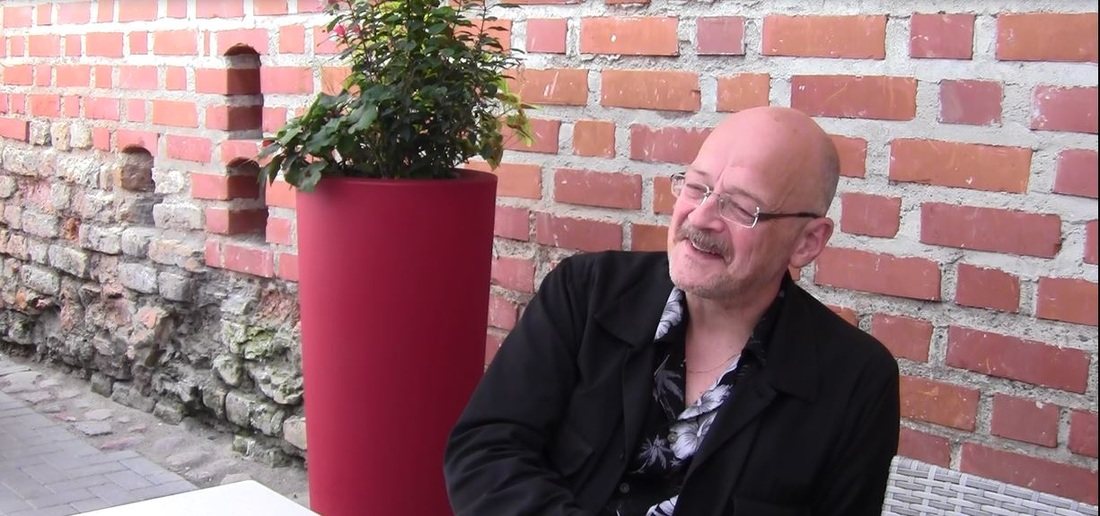|
Happy Groundhog Day! Are you eager for winter to end? We sure are...
Vidas: Hi guys, this is Vidas.
Ausra: And Ausra. V: Let’s start episode 392, of Secrets of Organ Playing Podcast. This question was sent by Ariane, who is our Total Organist student. And, she writes: I’ve been sight-reading some hymns from Bach‘s Christmas Oratorium. Why are his hymns just so special? They always give me goosebumps. V: She means probably choral harmonizations. A: Yes. I guess that’s what she means. V: And not only from Christmas Oratorium, probably in general, Bach’s choral harmonizations, from the cantatas, are very special. A: True. If I would have to answer such a question, I would say that if you think about Bach’s harmonic language, it’s very sophisticated, because he uses a lot of extra notes. V: Non-choral notes. A: Non-chordal notes. Probably much more than other composers, his contemporary composers, his predecessors. So that’s what I think maybe makes his chorals so not forgettable. V: What do you mean by non-chordal notes? What kind of notes could it be? A: Well, all kinds. He uses all the possible… V: Mmm-hmm. A: Variations. V: Such as? A: Well, now you are making, giving me a hard time because it’s really hard for me to use these all harmonic notes in English. V: Passing tones. A: Passing tones, neighboring tones, escape tones… V: Uh-huh. A: That can be at a… V: Suspensions. A: Of course many suspensions. And not in one voice but sometimes in all the voices he uses suspensions at the same time. V: Uh-huh. Maybe one voice doesn’t have suspension, to have the beat on time, and them the other three could have suspension. A: Yes, and he uses also these chords that gives such a nice color to the harmony, such as Neapolitan six chords, and all that secondary dominant chords. V: Mmm-hmm. A: And double dominant chords. V: So this is advanced harmony. A: Sure. Sure. V: Third year of harmony—in your school. A: Well, I don’t think my students would be able to analyze rightly Bach chorales. V: Mmm-hmm. Probably college level harmony. A: Well, definitely not in Lithuanian Academy of Music, that is not as it is right now. V: Mmm-hmm. A: But yes, college level harmony. V: You know, Bach never wrote a harmony textbook. A: Well, that’s why he left so much wonderful music. Instead of writing books, he composed music. So we can take his musical examples as books and study them. V: It is true that he did write a short guide and rules for harmonizing and playing the thorough base, right? I think maybe ten or twelve precepts, like rules—what to avoid. But it’s very short, like in one leaflet. But in general, nothing very extensive, and only his student Johann Philip Kirnberger together with CPE Bach, I think. A: Carl Philipp Emanuel. V: Yeah, CPE Bach collected his choral harmonizations from most of his cantatas, and published after his death in a volume called 371 Chorales. And this is like a testament of Bach’s mastery, plus we have to remember that most of Bach’s cantatas are gone. A: Not most of them but quite a large portion of them, yes, is gone. V: Mmm-hmm. Yes, so anybody including Ariane who is interested in Bach’s special musical arsenal and harmonic language, would do very well if they would pick up this volume of Bach’s chorals harmonizations and play and study and rewrite and transpose and internalize like that. A: But in general I think that Bach genius exceeded his contemporaries and in general probably, other composers of all generations. I don’t think anybody could compete on the same level as he was. V: Mmm-hmm. A: It would be a real challenge. V: And I wonder if it’s worth it. A: I don’t think so. V: Mmm-hmm. Like one time I submitted my seven choral improvisations for publication with Wayne Leopold, and this was my really beginning of improvisation practice. I mostly memorized those chorals and they became sort of written out pieces which I actually wrote out afterwards and put them, put a few of them on Youtube too (here and here), so people can listen even today. But the point is that I submitted the manuscript of seven choral improvisations. Those are I think almost all of, in trio texture, and I was so proud that I could imitate Bach’s style. But what I did is like, is what came out was like, maybe more of like Kreb’s style not Bach’s style. A: That’s fun. V: And a few months later, Wayne Leopold, the famous editor, wrote back that nobody can compete with Herr Bach, that I better create something original than imitation. And since then I think my view about composition in general and improvisation in particular, changed. I admire people who can imitate other masters, but in a long run, in historical run, fifty years from now, I think, like hundred years from now, what is more important, to leave a legacy of original works, not imitations. A: True. V: It doesn’t mean that I’m right or I’m wrong, and it doesn’t that other people shouldn’t have their own opinions about such matters. This is only demonstrates what I’m thinking at the moment, and I of course reserve the right to change my mind. Lots of things to think about, right?, on this gloomy, snowy Monday in Lithuania. We hope that wherever you are is not as gloomy and not as much snow as we have. Thank you guys for listening, for practicing, recording our suggestions. Please keep sending us your wonderful questions. And remember, when you practice... A: Miracles happen!
Comments
Vidas: Hi guys, this is Vidas.
Ausra: And Ausra. V: Let’s start episode 170, of #AskVidasAndAusra Podcast. This question was sent by Francois. He writes: Dear Vidas and Ausra, Many many thanks for this email about fingering in Bach's keyboard music. I also can’t find any system that works for Bach's keyboard music. But I prefer to refer to this topic in terms of articulation. And this brings me to a question about how you think. An example: in the c-minor invention, the 2nd of the 15 inventions I find different possibilities for articulation, based on resolutions, and fin different solutions good. No way to decide definitely. Maybe its ok to let some points open and offer different interpretations of the same piece, but that doesn’t satisfies me. Because I bet Bach had a clear idea about what he wanted for each piece he wrote. How do I find Bach's musical purpose, with details, for each of his pieces? Do you have an answer? Or a way to think about? Thanks in advance, Francois V: This is an advanced question, Ausra, right? A: Yes, a very advanced question. V: Do you believe that Bach always played his pieces, just in the one way, or maybe he changed some things? Adjusted. A: Oh, I think he had to adjust some things, probably. Because there are places in his music where you cannot play exactly as he wrote them, because he was so careful about his voice leading, especially his late pieces. That sometimes, you know, have to make some adjustments. V: What do you mean? A: Well, for example, in the E Flat Major, V: right A: Prelude, there is one spot where you hold a long note in your left hand, but at the same time, you are playing, you know, sixteenth notes also with your left hand. And some of those sixteenth notes are not the same as that long note that you are holding. And then you know, you just think, ‘what to do’? I will, you know not to play those sixteenth notes, or just to not hold that, that long note. So what would you in a situation like this? V: I would play the sixteenth notes… A: Yes,.. V: Because their more accurate,, A: That’s what they do. But it’s interesting you know. And I analyze that place and he did it because of voice leading. V: I see, right? It looks better on paper. A: Yes, V: this way. A: Yes. Yes. V: what he wrote. But in practice when you play it, exactly as it’s written, it’s unclear. A: That’s true. V: Right? You have to sacrifice some things and make adjustments in order for your listener to be able to hear what he wrote. A: I know, but it just shows how important for him, was actually the rules of voice leading. V: The rules meaning of avoiding parallel fifths, A: Yes. V: and things like that. A: yes, and all those, you know, bad things. V: Mmm, hmm. But didn’t he break the rules from time to time? A: Sure. Of course, he did that. He was an innovator in that way. V: He knew the rules but he could expand them and go beyond them A: Sure. V: when he needed. A: But I think he always knew exactly what he was doing and I think it’s very hard for us, you know to solve some mysteries of his music because I think there were hidden symbols in his music throughout his compositions. And I think, you know, it’s probably very hard for modern people to understand it. V: We lost long ago, the language of rhetorical figures, right? A: Yes. And like for example, he often used his birthday as a signature in his musical compositions. That’s what I heard about famous, choral from the Clavierbung third part “Vater Unser”. V: Right. A: Which has that bizzare part in the pedal line in the middle of the piece, it’s very odd. A: In exact middle of the piece, there is this spot which is, which might be a musical signature of Bach. A: Yes. And of course you can often find his real signature B-A-C-H. And so on and so forth. It’s a real mystery and a life-long study. V: For us in modern day, when we see what’s written on the page, we tend to analyze the harmony, the polyphony, the voice leading, the form, the texture. But for him, it was more than that, right? It was an idea first, probably,,, A: Yes. V: what he needed to create. He didn’t probably think ‘oh, I need to create a prelude in E Flat Major today, and it will have three themes, and eight episodes, and let’s see, maybe I will use the Italian concerto form with ritornello, okay. Maybe my ritornello will be part A, then B, then I will repeat section A in the dominant, then B again in the dominant. What about C then, will come the part? C-A-B, A-B-A-C, A-B-C-A, and that’s it. Eight parts, and I’m done’. No he probably thought about the symbolic meaning about the keys, right, three flats,,, A: Yes, V: about the whole thing. A: Yes, very symbolic, yes. V: What else did he think about, Ausra? Can you… A: What are you asking me? Do you think I’m closer to Bach than you are? V: Of course! A: I don’t think so. V: You have studied your entire life Bach’s works, and maybe you can think deeper than I do. A: Well, I don’t think so. I really don’t think so. But, you know, if we would go back to the fingering and articulation question about playing Bach’s music: I for example always think about meter first, and actually meter is, is you know, the main object for me when playing his music. That’s how I select my articulation. What about you? Is the meter important for you, when selecting articulation and fingering? V: Meter is probably the most important thing for me, yeah. It used to be a different thing in the past for me, but now, I always tend to think meter, about the pulse. A: Yes. V: when I play, and whenever I remember to count in strong and weak beats and make alternations between strong and weak beats in terms of articulation, right? Then, then the composition comes to life. And I might not understand all the symbolical figures, right, that Bach put, the sigh motive, the Figura Corta, A: Cross sign. V: Cross, exactly. All those intricate details that he knew and people back in the day knew. At least educated people back in the day knew. Because you have to remember, his music is like musical sermon. Cantata are like that, right? And if he had an idea, a religious idea for example, he put those religious objects into his music. A: Yes, especially in choral based music because it has text. So you can find lots of text painting. V: Mmm, hmm. It’s hidden in the music. But today, we have lost a lot of that, right? We don’t speak that language anymore. Even if we find excerpts of that, and we can, you know, discover, oh, this is one motive, it means like that, it means one thing, and another motive means another thing. Yes, but we are not relating to those things anymore. We have to remember Bach was one of the last composers in the western tradition, who believed the old belief system, world conscience, remember, A: Yes. V: he thought about the universe as the force which is greater than man, right? A: That’s true. V: That’s what Christianity tells us, right? And in modern days, composers think that, you know, science can solve a lot of problems, at least in the future, right? Not maybe today but it will be developing fast, with leaps and can solve a lot of mysteries in the universe. Bach, on the other hand, believed that some mysteries are never meant to be solved, probably. A: And I think he was right, probably. V: Excellent, guys. Let’s keep the mystery going. A: Yes, and I think, you know, going still back to that question, I think, you know, that learning any piece of Bach is a life-long process. And maybe, you know, now your playing in this manner and maybe after ten years or after five years, it will change your opinion a little bit and you play it a little bit different. A little bit different articulation, a little bit different tempo, and you know, you will feel it a little bit different, and it’s okay. V: It’s not okay, Ausra, it’s wonderful. It’s the way it should be because we think about that, about Bach as a demagogue, right? But he wasn’t an artist, basically. And artists never do the same things twice. A: Yes. V: They try to invent, recreate old ideas in new ways, combine them. So I think the best way you could approach Bach’s music is, today you play one way, and tomorrow you try to find out a little bit different angle, how you can articulate or finger something, or create a different version of pedaling. And maybe on Wednesday, you will do something different still. That’s okay. It’s actually encouraged to do this way. A: Yes. Because his music is so rich that each time you play the same piece, you can find new things. V: Mmm, hmm. A: And you know, to find a new way how to approach a particular piece or a particular spot. V: What would happen otherwise, if a person discovers a real true Bach system, and says, ‘oh, I’m set for life now’? A: Well, then it will be over. V: That person won’t evolve anymore. A: That’s true. V: Mmm, hmm. I hope we can do better than that. Thanks guys, this was Vidas. A: And Ausra. V: And remember, when you practice… A: Miracles happen! Welcome to the Secrets of Organ Playing Podcast #6! Listen to the conversation Today's guest is Hans-Ola Ericsson, a world-renown Swedish organist, pedagogue, and composer, currently the head of organ and church music department at McGill University in Canada. He shares his expertise and insights on modern organ music, the music of Bach, earlier music, his compositions, and of course his interest in the nature of sound, because he is also the creator of Studio Acusticum project in Piteå, Sweden. Below is the video version of our conversation: Enjoy and share your comments below. If you like these conversations with the experts from the organ world, please help spread the word about the SOP Podcast by sharing it with your organist friends. Relevant links: Organ and Church Music Department at McGill University Hans-Ola Ericsson's recordings on Spotify Studio Acusticum project Hans-Ola Ericsson's profile on Facebook |
DON'T MISS A THING! FREE UPDATES BY EMAIL.Thank you!You have successfully joined our subscriber list.  Photo by Edgaras Kurauskas Photo by Edgaras Kurauskas
Authors
Drs. Vidas Pinkevicius and Ausra Motuzaite-Pinkeviciene Organists of Vilnius University , creators of Secrets of Organ Playing. Our Hauptwerk Setup:
Categories
All
Archives
July 2024
|
This site participates in the Amazon, Thomann and other affiliate programs, the proceeds of which keep it free for anyone to read.
Copyright © 2011-2024 by Vidas Pinkevicius and Ausra Motuzaite-Pinkeviciene.
Terms of Service and Privacy Policy
Copyright © 2011-2024 by Vidas Pinkevicius and Ausra Motuzaite-Pinkeviciene.
Terms of Service and Privacy Policy







 RSS Feed
RSS Feed